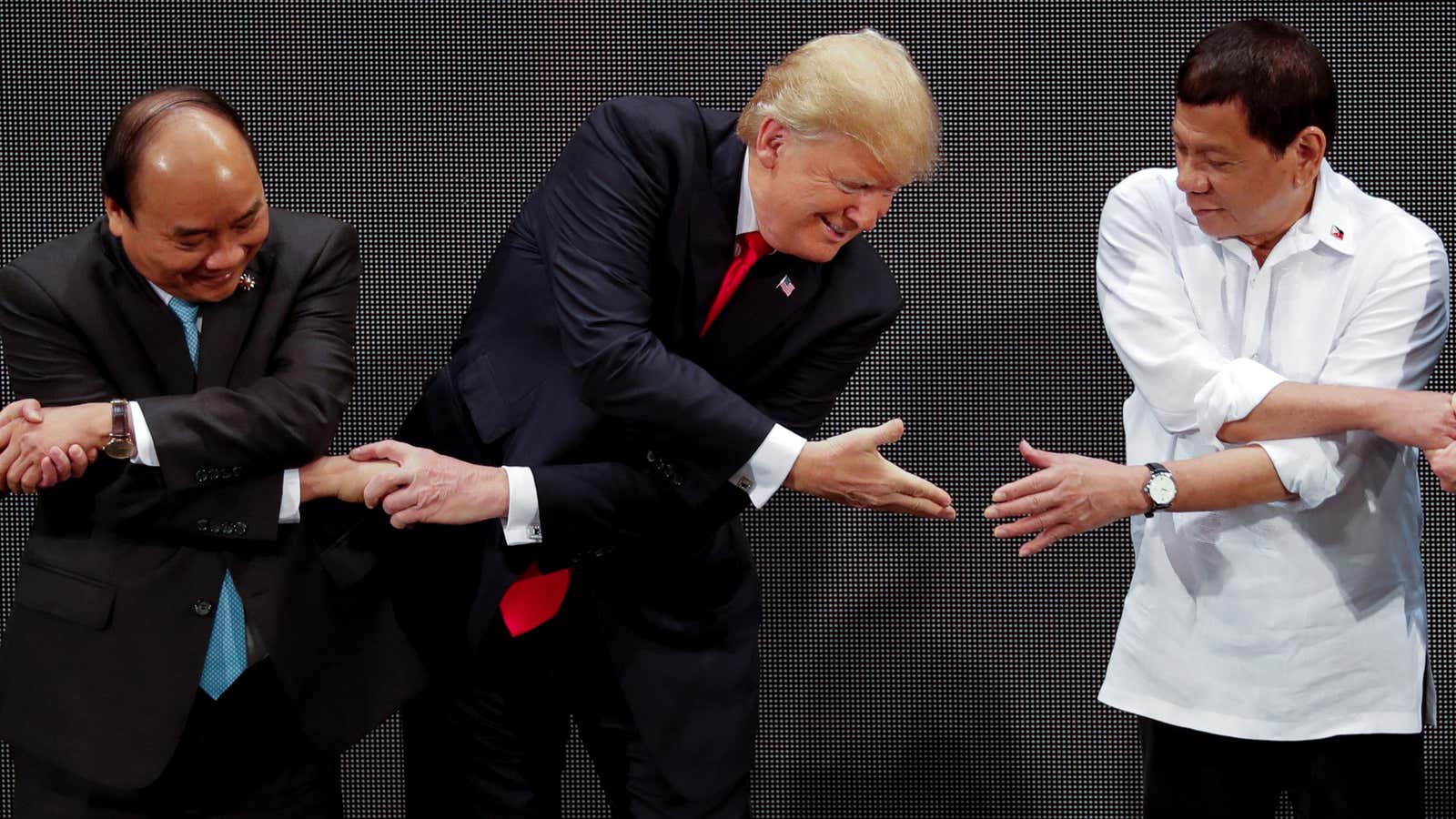US president Donald Trump offered his services as a mediator in the South China Sea territorial dispute while meeting with Southeast Asian leaders over the weekend. None seemed particularly interested in taking him up on his offer—but it could still remain one of the few good options on the table.
Trump was mostly restrained on the issue during his just-ended Asia tour. While in Beijing last week, he didn’t publicly mention the South China Sea, focusing instead on trade and North Korea while boasting of his “great chemistry” with president Xi Jinping. During a keynote speech at the Asia-Pacific Economic Cooperation (APEC) summit in Vietnam after leaving Beijing, Trump described “territorial expansion” as one of the biggest threats in the region, but he didn’t name the South China Sea outright. Over the weekend, Trump finally addressed the issue directly, and billed himself as a dealmaker.
“If I can help mediate or arbitrate, please let me know… I am a very good mediator,” he told Vietnamese president Tran Dai Quang at the start of their meeting Sunday, acknowledging China’s position on the South China Sea as a problem.
On the surface, Southeast Asian leaders appear to have given Trump the cold shoulder. Quang didn’t respond directly to Trump’s offer, but said Vietnam is determined to settle disputes in the sea “through peaceful negotiations.” Instead, during the meeting between Xi and Vietnam’s Communist Party chief, Nguyen Phu Trong—which happened hours after Trump’s sales pitch—the two sides reached an “important consensus” over the South China Sea issue, according to Chinese state media. Vietnam’s state broadcaster offered more details and said that Xi affirmed his willingness to work on a code of conduct (COC) in the sea—an effort that has dragged on for more than a decade.
In response to Trump’s mediation suggestion, Philippine foreign affairs secretary Alan Peter Cayetano said that the 10-member Association of Southeast Asian Nations (ASEAN) can’t “just give an instant reply” to the US president’s “generous” offer. Under president Rodrigo Duterte, the Philippines has demonstrated little interest in confronting China over the South China Sea issue, choosing instead to seek closer economic ties with Beijing. Duterte even said that the issue is “better left untouched” at this week’s ASEAN summit.
“What we do not see from the headlines is the behind-the-scenes negotiations,” says Anders Corr, founder of Corr Analytics. “That Trump has put pressure on China by offering to mediate gives the Philippines and Vietnam an additional bargaining chip in their negotiations with China.”
If China becomes more aggressive in the South China Sea, Corr argues, Vietnam and the Philippines could publicly accept Trump’s offer to be a mediator. If China refuses such mediation, he says, China would “look worse than it already does” for refusing to abide by a 2016 international tribunal ruling that went against most of its claims in the sea.
“Trump’s offer to mediate has the immediate effect of constraining further expansion by China in the South China Sea,” Corr says.
Wu Xinbo, a US affairs specialist at Fudan University in Shanghai, said Trump’s offer was unwelcome in Beijing and seemed aimed at stoking tensions to counter China’s growing influence in the region. “Vietnam has pinned its hopes on Washington to rein in China, and Trump’s latest offer shows they are colluding on the South China Sea issue,” he told the South China Morning Post.
Tension between Hanoi and Beijing spiked in July, when China pressured Vietnam to stop gas drilling in disputed waters. Hanoi initially refused China’s demand but reversed course later, reportedly after China threatened to attack Vietnamese bases in the sea.
On Monday (Nov. 13), China and the 10 ASEAN member states announced that they have agreed to start the negotiations for the text of the COC in the South China Sea, although it is not expected to be a legally binding document to keep China from building islands and military bases in the waterway.
“If past is prologue, this process is likely to be protracted and frustrating, especially for Southeast Asian countries who are keen to have a legally binding, comprehensive and effective COC in place as quickly as possible,” wrote Ian Storey, a senior fellow at Singapore-based ISEAS-Yusof Ishak Institute, in an August report.
The COC is “part of China’s take-and-talk strategy,” says Corr, noting that Beijing has been encouraging “fruitless” negotiations over a COC for 15 years, while building and militarizing its artificial islands “at a much faster rate than other claimants.”
